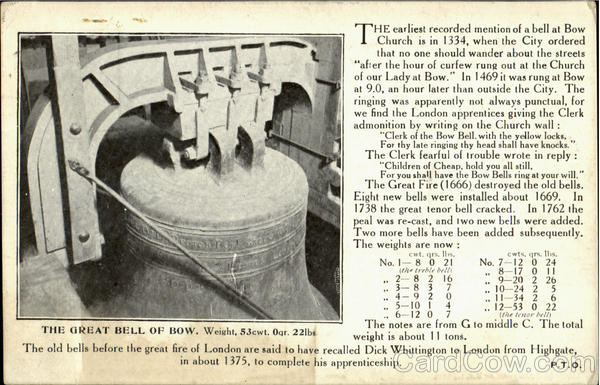|
THE earliest recorded mention of a bell at Bow Church is in 1334,when the city ordered that no one should wader about the streets "after the hour of curfew rung out at the Church of our Lady at Bow."I 1469 it was rung at bow at 9.0,an hour than outside the City.The ringing was apparently not always puctual for we find the London apprentices giving the Clerk admonition by writing on the Church wall: "Clerk of the Bow Bell ,with the yellow locks.For thy late ringing thy head small have knocks."The Clerk fearful of trouble wrote in reply:"Children of Cheap,hold you all still,For you shall have the Bow Bells ring at your will".The Great Fire(1666)destroyed the old bells.Eight new bells wre installd about 1669.In 1738 the great teor bell cracked.In 1762 the peal was re-cast,and two new bells were added.Two more bells have been added subsequently.The Weights are now:No1-cwt.8,qrs.0,lbs.21,No2- 8 2 16,NO3- 8 3 7,NO4- 9 2 0,NO5- 10 1 4,NO6- 12 0 7,NO7- 12 0 24,NO8- 17 0 11,NO9- 20 2 26,NO10- 24 2 5,NO11- 34 2 6,NO12- 53 0 22,(the tenor bell).The notes are from G to middle C.The total weight is about 11 tons.The old bells before the great fire of London are said to have recalld Dick Whittington to London from Highgate,in about 1375,to complete his apprenticeship.People born within the sound of Bow Bells are termed "Cockneys",-a term said to arise from a misshapen egg called by some country-folk a "cock's egg".and applied by them to townfolk as being poorly developed and misshapen.Another story is that a London boy hearing on a visit to the conntry a horse's neigh,asked what the noise was,and was told;he then heard a cock crowing and said:"That's a cock's neigh then."Thus the term was applied to one who Knew little of country life.It will be recollected that in the children's game of "Oranges and lemons"occurs the followig line:-"I am sure I dont know,says the Big Bell of Bow". |



